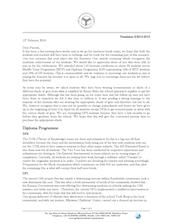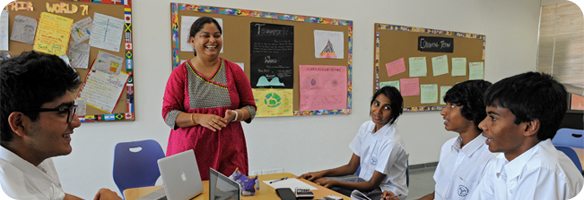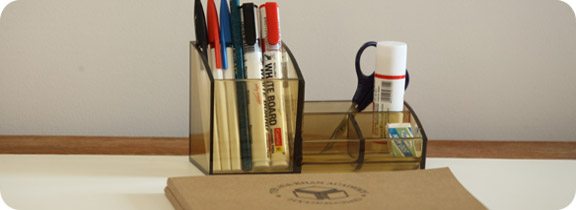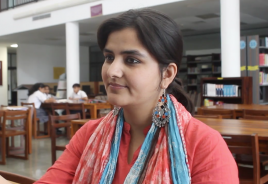Toronto Mayor speaks about us!
Mayor John Tory, who visited the Academy in March 2017, has written about his experience in an article titled, 'The year diversity defined our strength' published in the Toronto Star. Click here to read more!
Senior School Newsletter No. 6 - February 2016

Read about all the acitvities that have kept us busy at the Senior School this month!
Open Film Screening: Before the Flood
Join us from 4-5:30 pm at the Lecture Theatre to learn more about climate change. Open to all students, teachers, parents, staff-members.

Job Opportunities
The Aga Khan Academy Hyderabad is committed to hiring the best educators and staff from within the local community, nationally and internationally. We welcome your interest in working with us and invite you to explore the opportunities available.
About the Aga Khan Academy Hyderabad
Set on a stunning 100-acre campus, south of the historic city of Hyderabad, the Aga Khan Academy Hyderabad is part of a network of Academies. Based on the vision of His Late Highness Prince Karim Aga Khan IV, the Academy recruits exceptional students from diverse backgrounds irrespective of their ability to pay. Our holistic educational philosophy, International Baccalaureate curriculum and commitment to pluralism enables students to become ethical leaders who are empowered to make positive contributions in an ever-changing world. To find out more about the Academy, click here.
Working at the Aga Khan Academy Hyderabad
Here at AKA Hyderabad, we are united in the belief that education can be a force for good in the world. We look for outstanding educators whose work is characterised by passion, the ability to inspire others and make a difference, and work that is committed to helping students find their grand passion in life.
We recognise that the knowledge, skills and experience of our staff are a vital part of achieving our commitment to excellence. The Academy is strongly committed to continuing education for our faculty, and we provide regular opportunities for professional development.
The Academy is also proud to offer an outstanding work environment with excellent facilities and a unique and diverse school community.
For more information on any available vacancies, visit the AKDN Career Centre. Listings are updated regularly, so be sure to check back often.
Maryam: Becoming a better teacher
The Teacher Preparation Programme (TPP) is one of the Aga Khan Academies’ landmark teacher development initiatives. In this interview with Kamini Menon at the Aga Khan Academy Hyderabad, TPP participant Maryam talks about the TPP’s unique aspects and her experience with the programme.
Please tell us a little bit about your background.
I’m a part of the Teacher Preparation Programme in Hyderabad. This is my fifth year in teaching, and previously I worked for a Teach for India school in Delhi teaching 48 amazing girls. When my fellowship with Teach for India was over, I applied to the Academy, and here I am.
What made you join the Academy and inspired you to come here?
My previous experience as a Teach for India Fellow made me feel like I wanted to something more than just being a teacher. So I was looking for an option post-fellowship that shared a similar mindset or similar values. When I read about the Academies, the vision really interested me as well as the whole inclusive policy: giving a chance to anyone coming from any background and making sure that we provide them this idea of excellence in education. That was something that really inspired me, and so I joined the Academy.
Talk about the Teacher Preparation Programme (TPP) and where you are in that journey.
The Teacher Preparation Programme is the initiative of the Academies to make sure that we have home-grown teachers who become IB educators. This is a great initiative. This is my ninth month into the programme, and I teach in a classroom, I research, and do a lot of things at the same time. I am getting mentored by experts and improving my pedagogy every day.
Can you explain the structure of TPP? How it is organised and what does it involve?
The programme is an intense 18-month long process, and you do things in phases. In Phase One, we were in a classroom, paired with a mentor, teaching 20% of the time. Now, we are in Phase Two, and I have to teach 50% of my time in a classroom. But it’s not just the teaching. We also have to write an action research paper, which is crucial to the whole programme. Another thing which is important is the Problem-Based Learning Sessions, which are a great way to reflect on who you are as a person, not just as a teacher. In these sessions, we meet three times in a week, and we bring together all our research findings and what we have collected, and we progress to the next learning target. We work on this in groups, and then we get to reflect and apply that in a classroom at the same time.
Can you share two aspects of the programme that you find particularly unique or helpful?
For me, the most interesting part was problem-based learning. It takes a lot of patience to think in a broader way about a problem. The problem sets are given to us – then you create your learning targets, and the whole group researches with different objectives. That makes you really responsible, that improves your research skills. At the same time, it teaches you how to collaborate with members of the group. Another part that I find really interesting and at the same time challenging is my action research piece. It’s not just research; the action part is the most challenging part because you have to reflect on your own practice. For example, I am doing something on inquiry right now, but it’s not just inquiry – it’s “why inquiry in an IB classroom?” or “why even think of those big theories?” So, this has made me more reflective, it has made me more thorough with my work. At the same time, if and when I fail, it’s alright to seek advice and it’s alright to go back to my mentor to ask why this did not work in a classroom. Both problem-based research and the action research, I find that these are pushing me to become a better teacher.
How would you evaluate the model of mentorship that’s in place within the TPP?
Sandra is our mentor, and she is a really experienced Ontario teacher. She has streamlined the programme, she gave it more structure and depth. When you work with Sandra, you are not intimidated by her. You are working with an expert who knows so much, but at the same time she gives you a chance to really apply yourself. She is a mentor for me when I am doing anything in the classroom – she is always providing me with constant feedback on my pedagogy and on my action research paper. Even in the intense Problem-Based Learning Sessions, where it gets a little crazy at times, Sandra is always there to nudge you in the right direction so you come to a conclusion.
How do you and your colleagues in the TPP work together and collaborate?
We are a very diverse group. Sitting with all of them has made me a better teacher in so many ways. It is not easy to admit sometimes that you don’t know things, but I get to learn from these people because their experience, our discussions, and the help we give each other is really great. We also collaborate outside the classroom – for example, if I have a doubt or find something challenging, I go to one of these colleagues and ask for their help. They are always there for me. We really push each other to reflect, to ask the right questions, which makes you think.
Can you talk more about the process of reflection that you have in your TPP group?
For us, reflection is about making yourself vulnerable in front of the whole group. It is not easy – it is not at all easy. We don’t reflect on a superficial level; we have to really apply ourselves in the entire process. When create our reflections, we have to share them with the whole group – and the group knows and understands who you are and gives you feedback. They push you to think along certain lines, and our mentors force us to think about the way we think – it becomes more about metacognition. The whole idea of learning from someone is that you have to be vulnerable and sometimes even fail, and then admit that you failed. When you draft that experience into a reflection, it makes you a better teacher. And definitely a better person.
How do you think the TPP has made you a better person in actual fact?
The way the TPP is designed, you become a reflective practitioner – that’s the goal! You teach in a classroom and you know that it’s not just a physical space, it’s much more than that. You cannot teach in isolation – you have to collaborate with other people, you have to go and ask for help. At the culmination, you really will become a better teacher. It’s a rigorous process, it’s an intense process, it’s a very reflective process. But the goal is that, ultimately, you will be the kind of teacher you want to be as well as an effective teacher.
Can you give us an example of how you’ve applied something you’ve learnt through the TPP in a classroom setting?
Right now, I am doing an action research, and a huge chunk of this is based on inquiry-based learning in a classroom. I’m teaching grade 6, and the unit I was dealing with was “did they live like us?” It is a lot about civilisations and the way people lived and interacted with their environment. All the research that I did during the Problem-Based Learning Sessions and my action research, I applied it in this classroom setting. I created the lesson plan and then got the feedback from my mentors. Then it gave me a chance to reflect on my practice: sometimes I tend to go a little overboard, and I got to see if my plan would work out. This is how you become a better teacher.
Is there anything else that you’d like to add about the TPP?
I’ll say, for the whole process, you have to be very open. You have to be open-minded to get into this process. It’s not easy just to acknowledge that you’re going though 18 months of training – you might feel intimated, or that your prior experience doesn’t matter. But that’s not the point. The point is to become a better teacher. If that is your goal, then this programme will work for you. The way this programme is designed is rigorous and beautiful. The most important point depends on you: what do you want to take away from this. And there is a lot, if you are really open to exploring.
Student experience at 2016 Peace Summit
The Peace Summit is an annual event conducted over a period of two days by the DP1 cohort for Year 9. It is one of the most actively student-driven events at AKA Mombasa. Preparation for the Peace Summit begins well in advance, with DP1 students starting to work on their modules since August last year. The main aims of this Peace Summit were to make us believe that peace is possible, empowering us to be leaders, showing us how to work together to resolve conflicts, and devising sustainable solutions to global issues. The main theme of this year’s Peace Summit was Conflict Over Resources, and our first activity at the Peace Summit was the Hunger Banquet.
The Hunger Banquet was an activity where Year 9 students were divided into three groups; low-income, middle-income, and high-income. Each group was treated differently according to their socioeconomic status. The poor people were given boiled rice, the middle class was served cake, and the rich people were provided with a proper breakfast. We were all in a place where we could clearly observe how the other groups were being treated. The Hunger Banquet was a very accurate depiction of our world today - less than one percent of the global population being rich, and the majority being poor. After this activity we concluded that the cycle of poverty affects generations and is really hard to escape. Also, the rich people group was only able to help a small number of poor people, which showed how the rich don’t have a large-scale impact on alleviating poverty. The Hunger Banquet was an amazing introduction as it made us think of sustainable solutions to breaking out of the cyclical nature of poverty – which was what the Peace Summit was mainly about.
We had two guest speakers come in during the Peace Summit to enhance our knowledge; the Manager of Facebook in Kenya, and a member of the COBURWAS. The Manager of Facebook in Kenya, Naheed Hirji, talked about how the internet can be used as a tool to create peace if used in the right manner, and how it has previously been used to destroy peace. He talked about the ways the world has improved due to technological advancement and also discussed the pros and cons of the internet. Our second guest speaker, Joseph Munyambanza, was a Congolese person who had lived in Uganda for most of his life and had worked in refugee camps on providing children education for a brighter future. He enlightened us with his journey and explained how his programmes help children in acquiring quality education. The two speeches were of great benefit to us, as they educated us about real-life attempts to create peace.
During the modules of the Peace Summit, we talked about different crises around the world and proposed possible solutions to them. We used many case studies such as – Coltan mining in DRC, and the water crises between Tajikistan and Uzbekistan. We talked about all sorts of things during these modules, analyzing each of these situations in-depth and suggesting better solutions for each issue. The Peace Summit provided us with a platform to debate current issues, propose solutions for them, and also reflect on them critically. These two days greatly helped us realize how privileged we are to have all the resources we do and to live in an environment much safer than many children who are currently suffering. It also made us believe that we can make a change, no matter how small – it will definitely impact the world in one way or another. We are all part of this world and we all contribute to the problems of the world in a positive or negative manner – so let’s make it positive and work on resolving the problems in our world. Let’s Make A Change!
--Tabreek Somani, Year 9 (The Reporters)

Financial Assistance
Admission to the Academy is based on merit and is means-blind. Students from all socioeconomic backgrounds who satisfy the requirements for entry are encouraged to apply.
Partial to full financial aid is available to accepted students with a demonstrated need. Financial aid awards are reviewed annually and renewed only after reassessment of financial need.
For information about admission, scholarships and financial aid please contact us by email.
DP1 Students Benefit from an Immersive Experience in Rwanda
The pictures take us on a journey to Rwanda with 12 Diploma students of Individuals and Societies (Humanities) as they sought to answer questions about violence, peace and reconciliation, and adversity in the face of the horrors of the Rwandan genocide. The students traveled from 7-10 June 2017, accompanied by two teachers, Mrs. Bhagirathy Jhingran and Mrs. Susan Abuto.

